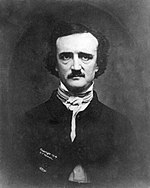
Produced by:
Johns Hopkins University
October 26, 1958
Description:
This program, which originally aired on October 26, 1958, takes a close look at the life and work of Edgar Allen Poe. Though dated, the presentation is well done and entertaining.
Speaker(s):
John Astin, actor; visiting professor, School of Arts & Sciences, Johns Hopkins University
Link: http://www.researchchannel.org/prog/displayevent.aspx?rID=3428&fID=571
Runtime:00:33:38
Notes:
Edgar Allan Poe (January 19, 1809 – October 7, 1849) was an American poet, short-story writer, editor and literary critic
Writer
Best known for his tales of mystery and the macabre,
Poe was one of the earliest American practitioners of the short story
invented the detective-fiction genre.
He is credited with contributing to the emerging genre of science fiction.[1] He was the first well-known American writer to try to earn a living through writing alone, resulting in a financially difficult life and career.[2]
His most recurring themes deal with questions of death, including its physical signs, the effects of decomposition, concerns of premature burial, the reanimation of the dead, and mourning.
Had a theory of `single effect'-(depth) He advocated a prose tale (Poe's term for a short story) as a narrative that could be read at one sitting, from a half an hour up to two hours. He was adamant that such a story should be limited to "a certain unique or single effect" to which every other detail was subordinate. This concept emphasized unity of mood, time, space, and action working together to achieve the "certain unique or single effect."
Poe's ideal of the "certain unique or single effect," a short story has a succinct straightforward plot and characters that are disclosed in action and dramatic encounter rather than description and comment. In addition, by only including the number of characters and scenes necessary to the plot, concise narration and economy of setting are encouraged, therefore allowing the story to be communicated to the reader in its allotted time.
A typical plot of the literary short story begins near the climax and revolves around a character with a specific problem to solve. The plot climaxes when a recognizable change (for better or worse) occurs in the character or his/her situation as a direct result of having solved (or having failed to solve) the problem. Once the climax has been reached, the story quickly draws to a close.
As Critic
Critical of those with an inability to distinguish `obscurity of expression from expression of obscurity.
-(depth) Eschew obfuscation, also stated as: "eschew obfuscation, espouse elucidation", is a common humorous saying of English teachers and professors when lecturing about proper writing techniques.
Literally, the meaning is "avoid ambiguity, adopt clarity", but the use of relatively uncommon words in the English language itself causes confusion, making the phrase a prime example of irony. (depth) Irony is a literary or rhetorical device, in which there is an incongruity or discordance between what a speaker or a writer says; and what he or she means, or is generally understood.
He disliked didacticism[89] and allegory,[90] though he believed that meaning in literature should be an undercurrent just beneath the surface. Works with obvious meanings, he wrote, cease to be art.[91]
depth- didactic- The term "didactic" also refers to texts (and by extension, media, such as film or television) that are overburdened with instructive, factual, and/or otherwise "educational" information, sometimes to the detriment of a reader's (or viewer's) enjoyment. The opposite of "didactic" is "non-didactic." If a writer is more concerned with artistic qualities and techniques than with conveying a message, then that piece of work is considered to be non-didactic, even if it is instructive/educational.
Some have suggested that nearly all of the best poetry is didactic. Contrarily, Edgar Allan Poe called didacticism the worst of "heresies" in his essay The Poetic Principle.
Products:
